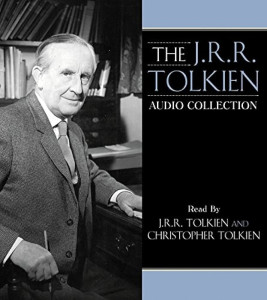 Rachel Manija Brown wrote this review.
Rachel Manija Brown wrote this review.
This four-CD set from Harper Audio/Caedmon is an odd mix in many ways. All the material is by J. R. R. Tolkien, but only two of the CDs, consisting of excerpts from The Hobbit, The Lord of the Rings, and The Adventures of Tom Bombadil, are read by the author. The other two, excerpts from The Silmarillion, are read by his son Christopher Tolkien.
Christopher Tolkien reads fluently and with an elegant accent. But he is deadly dull, makes no attempt at different voices for different characters, and has only two inflections: Sonorously Dramatic and Sonorously Really Dramatic, the latter reserved for moments when hands are getting bitten off and kin are slaying each other.
This is doubly unfortunate, as much of The Silmarillion is not exactly thrilling to begin with. The excerpts he reads include some of the most narratively coherent, well-characterized, and exciting parts, such as “The Silmarillion of Beren and Luthien” and the portion of “Of the Darkening of Valinor” which concerns Shelob’s precursor Ungoliant. As for the rest, despite my own many attempts to read the book, my eyes glaze over against my will, and I can never say why Feanor and his kin had their falling out. Thanks to C. Tolkien’s soporific reading, I still can’t.
The only reason C. Tolkien did these readings is his distinguished parentage; and unlike the blood of Numenor, that doesn’t count for much. We’d have been far better off with Rob Inglis, the Royal Shakespeare actor and reader of the unabridged Lord of the Rings.
J.R.R. Tolkien’s readings are a different matter. Most especially, his lively and very funny rendition of The Hobbit‘s “Riddles in the Dark” is an enormous treat, from his hissing, spluttering Gollum to his deadpan professorial asides concerning the difficulty of thinking of riddles when you’re sitting next to a slimy creature who wants to eat you.
Most of the rest of the excerpts are poetry, of widely varying poetic, reading, and audio quality. Generally, the humorous poems come across better than the serious ones; Sam’s song of the troll, which Tolkien sings in a rustic accent, is infinitely more enjoyable in every respect than the excruciating lament for Boromir. During the latter, I started thinking that if the three companions had skipped the song and started chasing the orcs immediately, they would have gained an entire day and possibly caught them.
The most unexpected delight of the collection was Tolkien’s rolling, rumbling Entish; the most unexpecting irritant were the overly cute Tom Bombadil poems.
The few text excerpts are of similar quality to the one from The Hobbit. They are genuinely dramatic, not like C. Tolkien’s over-lofty affected drama, but are all too short, often ending just before the key episode begins. Tolkien reads of Theoden’s charge, but not of Eowyn and Merry’s confrontation with the Witch-King; of Sam and Frodo’s second-last battle with Gollum, but not the confrontation at the Crack of Doom that immediately follows it.
The sound quality also varies wildly from track to track. Not only are the Christopher Tolkien tracks of higher audio quality (naturally) than the older ones by his father, but the volume and scratchiness of each track fluctuates a great deal.
The set contains no explanation of when and under what circumstances the tracks were recorded, whether they are the only extant examples of Tolkien reading his own works, or how the excerpts were chosen. As much of the interest in this recording lies in its historical value, this is a significant omission.
All told, this is probably of interest only to Tolkien completists, of which I’m not one. But I wouldn’t have wanted to miss the relish with which Tolkien invests Gollum’s musings over whether Bilbo is “deliciously crrrrunchable.”
[Editor’s note: We used to own a copy of the LP containing J.R.R. Tolkien’s readings, and can confirm that his performance of “Riddles in the Dark” is, for a Tolkien fan, one of the most enjoyable moments ever preserved on vinyl.]
(Harper Audio/Caedmon, 2001)
